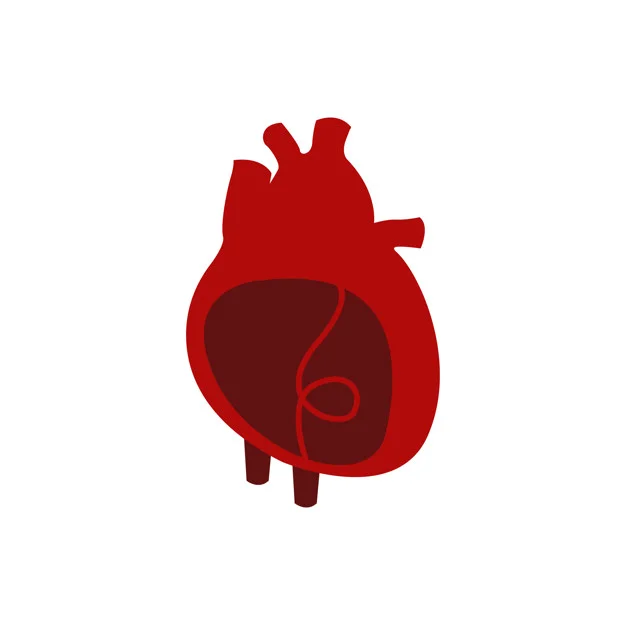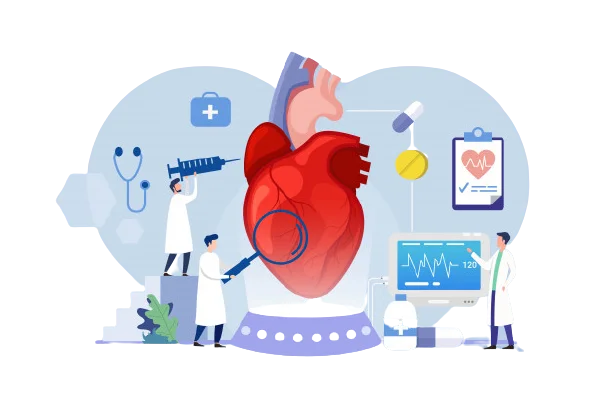Book Your Appointment
Congenital Heart Disease
Get Solution At Swasthyam Superspeciality Hospital
Congenital Heart Disease
Congenital heart disease is one or more problems with the heart’s structure that exist since birth. Congenital means that you’re born with the defect. Congenital heart disease, also called congenital heart defect, can change the way blood flows through your heart. Some congenital heart defects might not cause any problems. Complex defects, however, can cause life-threatening complications.
Advances in diagnosis and treatment have allowed babies with congenital heart disease to survive well into adulthood. Sometimes, signs and symptoms of congenital heart disease aren’t seen until you’re an adult.
If you have congenital heart disease you likely will need care throughout your life. Check with your doctor to determine how often you need a checkup.

Symptoms?
Some congenital heart defects cause no signs or symptoms. For some people, signs or symptoms occur later in life. And symptoms can return years after you’ve had treatment for a heart defect.
Common congenital heart disease symptoms in adults include:
- Abnormal heart rhythms (arrhythmias)
- A bluish tint to the skin, lips and fingernails (cyanosis)
- Shortness of breath
- Tiring quickly upon exertion
- Swelling of body tissue or organs (edema)
When to see a doctor
If you’re having worrisome symptoms, such as chest pain or shortness of breath, seek emergency medical attention.
If you have signs or symptoms of congenital heart disease or were treated for a congenital heart defect as a child, make an appointment to see your doctor.
Causes
Researchers aren’t sure what causes most types of congenital heart disease. Some congenital heart diseases are passed down through families (inherited).
To understand congenital heart disease, it helps to know how the heart works.
- The heart is divided into chambers (ventricles) — two on the right and two on the left.
- The right side of the heart moves blood to the lungs through blood vessels (pulmonary arteries).
- In the lungs, blood picks up oxygen and then returns to the left side of your heart through the pulmonary veins.
- The left side of the heart then pumps the blood through the aorta and out to the rest of the body.
Congenital heart disease can affect any of these heart structures, including the arteries, valves, chambers and the wall of tissue that separates the chambers (septum).

Causes



Researchers aren’t sure what causes most types of congenital heart disease. Some congenital heart diseases are passed down through families (inherited).
To understand congenital heart disease, it helps to know how the heart works.
- The heart is divided into chambers (ventricles) — two on the right and two on the left.
- The right side of the heart moves blood to the lungs through blood vessels (pulmonary arteries).
- In the lungs, blood picks up oxygen and then returns to the left side of your heart through the pulmonary veins.
- The left side of the heart then pumps the blood through the aorta and out to the rest of the body.
Congenital heart disease can affect any of these heart structures, including the arteries, valves, chambers and the wall of tissue that separates the chambers (septum).
Risk factors
Certain environmental and genetic risk factors might play a role in the development of congenital heart disease, including:
- Your genes. Congenital heart disease appears to run in families (inherited) and is associated with many genetic syndromes. For instance, children with Down syndrome often have heart defects. Genetic testing can detect Down syndrome and other disorders during a baby’s development.
- German measles (rubella). Having rubella during pregnancy may affect how the baby’s heart develops while in the womb.
- Diabetes. Having type 1 or type 2 diabetes during pregnancy also may affect a baby’s heart development. Gestational diabetes generally doesn’t increase the risk of congenital heart disease.
- Medications. Taking certain medications while pregnant can cause congenital heart disease and other birth defects. Medications linked to heart defects include lithium for bipolar disorder and isotretinoin (Claravis, Myorisan, Zenatane, others), which is used to treat acne. Always tell your doctor about the medications you take.
- Alcohol. Drinking alcohol while pregnant also contributes to the risk of heart defects in the baby.
- Smoking. A mother who smokes while pregnant increases her risk of having a child with a congenital heart defect.
Prevention
Both men and women with congenital heart disease are at increased risk of passing some form of congenital heart disease to their children. Your doctor might suggest genetic counseling or screening if you plan to have children.
Prevention
Both men and women with congenital heart disease are at increased risk of passing some form of congenital heart disease to their children. Your doctor might suggest genetic counseling or screening if you plan to have children.
Treatment
A congenital heart defect may have no long-term effect on your child’s health — in some instances, such defects can safely go untreated. Certain defects, such as small holes, may even correct themselves as your child ages.
Some heart defects, however, are serious and require treatment soon after they’re found. Depending on the type of heart defect your child has, doctors treat congenital heart defects with:
-
Procedures using catheterization:Some children and adults now have their congenital heart defects repaired using catheterization techniques, which allow the repair to be done without surgically opening the chest and heart. Catheter procedures can often be used to fix holes or areas of narrowing.
In procedures that can be done using catheterization, the doctor inserts a thin tube (catheter) into a leg vein and guides it to the heart with the help of X-ray images. Once the catheter is positioned at the site of the defect, tiny tools are threaded through the catheter to the heart to repair the defect.
-
Open-heart surgery: Depending on your child’s condition, he or she may need surgery to repair the defect. Many congenital heart defects are corrected using open-heart surgery. In open-heart surgery, the chest has to be opened.
In some cases, minimally invasive heart surgery may be an option. This type of surgery involves making small incisions between the ribs and inserting instruments through them to repair the defect.
- Heart transplant: If a serious heart defect can’t be repaired, a heart transplant may be an option.
-
Medications: Some mild congenital heart defects, especially those found later in childhood or adulthood, can be treated with medications that help the heart work more efficiently.
Message Us
Get In touch with us. Ask Any Question or Book Your Appointment Now
Emergency
+91-8600888444
Book An Appointment
0712-2222111
Contact Us
Location
97/98 Vivekanand Nagar, Near Sai Mandir, Wardha Road, Nagpur
Contact for
Emergency :- +91-8600888444
Book An Appointment:- 0712-2222111
For Latest Updates Follow Us On Facebook
